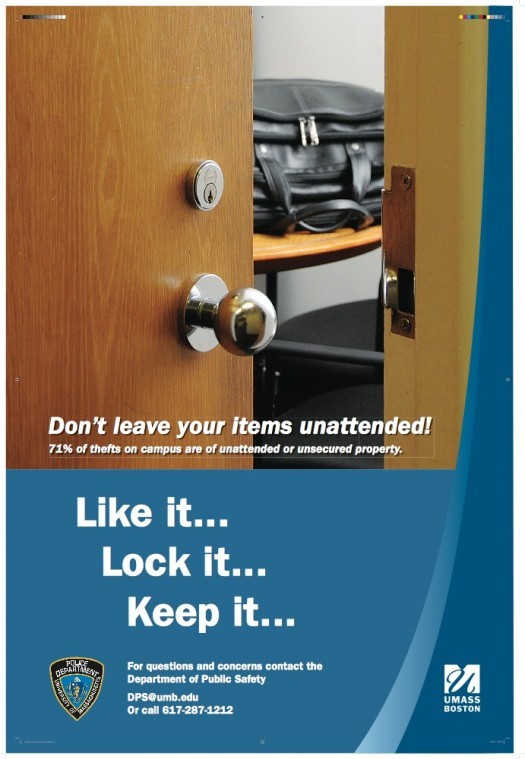The department of public safety has started a new incentive geared toward reducing theft occurrences on campus. The “Like it, Lock it, Keep it” posters and signs around campus are to serve as a reminder to students to keep their eyes on their valuables.
Officer Diane Kirkpatrick was at the forefront of the public safety ad campaign. Kirkpatrick reviewed the number of larcenies that were reported in the academic year of 2011.
“I discovered that of the 98 larcenies that were reported 70 of those thefts accrued when the victim momentarily left their belongings unattended,” Kirkpatrick said.
Kirkpatrick’s investigation also revealed theft hot spots on campus. Most thefts occur in the campus center, the least occur in the Quinn building.
“Theses are crimes of opportunity,” Kirkpatrick said. “It happens when a student is distracted, with studying or in a hurry, they leave their stuff thinking they’ll only be gone a minute, and within that minute somebody sees a phone or laptop sitting unattended and just grabs it.”
Hence the posters depicting a blurry student making a quick grab-n-go of someone’s stuff. “I wanted the signage to be familiar to students. I wanted them to see them and say to themselves ‘hey I study there, or I know that place’, and therefore be more cautious when they are in those areas,” Kirkpatrick said.
Kirkpatrick stated that no student was immune to random theft if they do not keep track of their belongings but the international students seem to be at a somewhat larger disadvantage because they are unfamiliar with the area, often reporting that they thought their stuff was safe because they are in an academic setting.
The “Like it, Lock it, Keep it” warning extends to faculty members as well. Posters have been designed depicting an office door left ajar with a warning about what could result. The police also place “gotcha” notices on open office doors. The notices serve as a reminder that next time the door is found open it could be a thief instead of a cop who finds it.
Kirkpatrick maintains that the UMass Boston campus is “very safe,” but that it is clear that theft is the most common crime committed on campus. “ Students just need to be aware of their surroundings and be proactive about protecting their belongings,” Kirkpatrick said.

